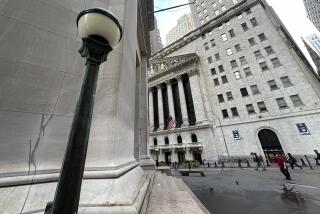Crude Oil Prices Soar to Level Not Seen Since ’91 Gulf War
- Share via
Crude oil prices on Monday topped $27 a barrel for the first time since the 1991 Persian Gulf War, after Iraq halted oil shipments and rejected a United Nations plan to extend an oil-for-food export agreement for two weeks.
Rising crude prices have pushed gasoline higher at the pump in recent weeks and the latest crude oil hike promises no relief for motorists.
Iraq, which normally exports about 3% of the world’s oil, is seeking an end to economic sanctions, including U.N. control over its oil exports. The U.N. plan to extend the export program temporarily came after Russia and the United States were unable to agree on terms of a new six-month plan.
“Thirty-dollar oil looks real if this suspension continues,” said Nauman Barakat, vice president of global energy trading at ABN Amro Inc. in New York. Iraqi President Saddam Hussein probably isn’t “going to agree to the extension of the present oil-for-food sales without any changes, so my assumption is that the suspension is going to be here for a while.”
Crude oil futures for January delivery soared 93 cents, or 3.6%, to $27.07 a barrel on the New York Mercantile Exchange, the highest closing price since January 1991.
U.S. retail gasoline prices rose to a 3 1/2-year high of $1.269 a gallon in the week ended Monday, according to an Energy Department survey of 800 filling stations, released Monday.
In California, the price of regular self-serve unleaded gasoline jumped nearly 2 cents to $1.365 a gallon. That will make Thanksgiving travel more expensive for the millions of people taking to the highways.
Gas prices, especially in California, could continue to rise because recent increases in crude prices haven’t yet reached the pump.
Every $1-per-barrel increase in oil translates into a 2.5-cent increase in the price of gasoline. Using that industry rule of thumb, California’s gasoline prices have room to increase further, said Rob Schlichting, a spokesman for the California Energy Commission.
The price of Alaska North Slope crude oil, which accounts for about half of the oil refined into gasoline in California, has averaged $22.68 a barrel so far this month, up $12.98 from the average price in November 1998. That year-over-year increase in crude means that gasoline should cost about 32 cents more per gallon than last year. But current prices are only about 21 cents higher, Schlichting said.
Crude oil prices have more than doubled this year as OPEC member nations and other exporters have cut production.
Thus, Iraq’s suspension of exports can only aggravate the supply situation.
Iraqi oil exports were put under an international embargo after Iraq invaded Kuwait in 1990. The U.N. since late 1996 has allowed Iraq to export limited amounts of oil to buy food and medical supplies, and to pay war reparations.
The current six-month round of the U.N.-sponsored program was to have expired Saturday, but was extended Friday for two weeks to allow the U.N. Security Council more time to discuss its renewal and longer-term policy regarding sanctions and weapons inspections.
Iraq, however, has refused to go along. An extended halt in Iraqi exports would also come amid rising demand for winter fuel in the Northern Hemisphere. What’s more, U.S. crude inventories are near two-year lows.
Iraqi Oil Ministry officials on Monday told foreign oil companies operating in the country that new directives were about to be issued, Agence France-Presse reported. The U.N.’s Iraq Program in New York had no new information on the status of oil exports.
“The Iraqis are going to push the price so high that the U.S. and Britain are going to have to give in” to Iraq’s demands, said Bill O’Grady, futures analyst at A.G. Edwards & Sons in St. Louis. By opposing Iraq, the U.S. and Britain “are going to risk their continued economic expansion.”
To combat any shortfall from a prolonged delay in Iraqi exports, it’s possible that either the U.S. would release oil from its Strategic Petroleum Reserve, or OPEC would boost its oil production levels, analysts say. But OPEC has so far shown no interest in raising production.
Asked whether the U.S. would release oil from the reserves because of the recent rally, Energy Secretary Bill Richardson told reporters that the SPR exists for national emergencies. “We think that the market should dictate SPR levels.”
* PUMP PRICES: Atty. Gen. Bill Lockyer documents California’s high gas prices. A3
(BEGIN TEXT OF INFOBOX / INFOGRAPHIC)
OPEC in the Driver’s Seat
Near-term crude oil futures in New York jumped to $27.07 a barrel on Monday, the highest price since the January 1991 Persian Gulf War, as traders focused on strong demand amid surprising production discipline on the part of the Organization of Petroleum Exporting Countries. Quarterly closes and latest for U.S. crude futures:
*
Monday: $27.07, up 93 cents
*
Source: Bloomberg News
More to Read
Inside the business of entertainment
The Wide Shot brings you news, analysis and insights on everything from streaming wars to production — and what it all means for the future.
You may occasionally receive promotional content from the Los Angeles Times.










